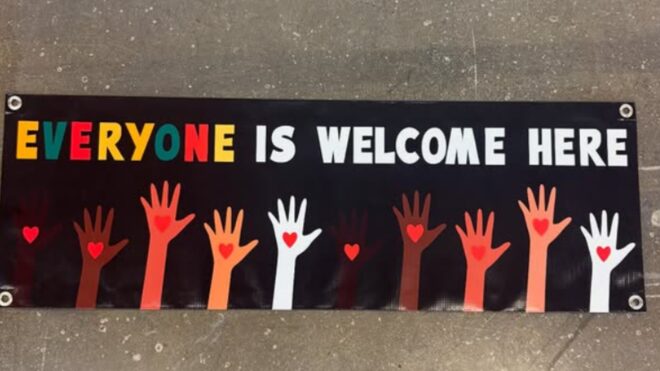
I think it’s safe to say that today’s generation of tweens and teens are testing and trying their teachers in ways we never would have dreamed. Teachers who once just broke up fights are finding that they’re the victim in physical altercations. Working with children has always been a challenging endeavor, but educators these days are having to get creative when it comes to walking the line between disciplining and nurturing.
One teacher recently went viral by sharing his recent success in working with a student who called him a name.
More from CafeMom: Teacher-Tested Advice To Help Kids & Parents Transition to Middle School
'A student of mine called me a B---- A-- 🥷 at 7:45 in the morning,' the teacher shared.
Dwayne Reed, an author, speaker, and editor recently shared a thread about how he handled a student insulting him first thing in the morning. “A student of mine called me a B—- A– 🥷 at 7:45 in the morning as I arrived to school,” Reed wrote, drawing in an audience of thousands.
“I was completely caught off guard by his comment and felt it was unwarranted, but here’s how it all played out,” he wrote. “I pulled into the school parking lot at 7:45AM, excited to get the day started. As I looked up through the windshield, I spotted three of my 8th grade boys, one of them pretending to hide his face from me. I chuckled, then greeted them with, ‘Good morning young Black kings.’” But the love wasn’t returned.
More from CafeMom: The 10 Best TV Teachers That Taught Us Important Life Lessons
Reed tried to confront the student in the moment.
“A millisecond after I finished my sentence, one student (we’ll call him Chris), blurted out: ‘Aye shut up, B—- A– 🥷.’ Reed said Chris and his friends laughed obnoxiously and started to move away. Before they could leave, Reed got out of his car to confront them. He recalls saying:
“Me: Yoo! What did you just say?
Friend 1: Mr. Reed, that was NOT me!
Friend 2: I ain’t say that either, bro.
Me (knowing who did): There are consequences for things we say and do. We gon’ see what the word is later.
(Mind you, I have these students first class of the day).”
As he walked into the school building, Reed was naturally troubled and confused by what he had just experienced. He wondered why Chris would say something like that. Had he done something to warrant the insult? He wondered how to classify the offense and how to punish it.
When they got to class, Reed was impartial.
Honestly, Reed shared that his first thought on how to address Chris came from a place of ego. Reed wanted his “lick back,” in order to teach his student a lesson about the ways in which he had hurt him. “My ego was bruised. I desired respect and empathy from him, but the route I first envisioned required punitive measures. 👎🏾,” he wrote.
But by the time he settled into his classroom, he’d made the decision to handle the situation more maturely. He asked himself a series of questions: “Why am I taking this personally? 2) Why should I ever feel the need to ‘get back’ at a student? 3) When do punitive measures ever help? 4) Why not be gracious and restorative?”
Reed wondered how the whole thing might go if he chose to forgive Chris in his heart before he had a chance to admit guilt or even apologize. When Reed went to retrieve his eighth graders from the gym, Friend 1 told Reed, “‘Aye, did you write us up? Cuz that wasn’t me.’ Chris, looking directly at his homie, said, ‘Bro, why you bein’ all scary? He ain’t finna write nobody up.’”
Reed maintained his composure. “I responded gently with: ‘We’ll discuss things later, gentlemen. Let’s head up.’” During class, the teacher taught the lesson as if nothing had transpired earlier. He called on Chris and his two friends whenever they wanted to participate.
'I want them to know that my character is one of grace AND truth,' Reed explained.
It wasn’t until the class ended that things got interesting. Reed asked Chris’ teacher for the next period if he could speak to him for a few minutes. When she agreed, Reed set up a chair right in front of his own so he and Chris could chat. He asked Chris if he knew why they were speaking. Chris said he had no idea. When Reed asked him if he’d said something outside, Chris said if Reed heard something, it was probably someone else.
The conversation went:
“Me: So you ain’t call me a BA🥷?
Chris: Nahh. I was talkin to some other ppl.
(I can appreciate that Chris was not quick to point fingers or implicate anyone else).
Me: So you didn’t look me in the eyes and call me that name?
Chris: I wasn’t talking to you, bro. You misheard.”
At this point, Reed realized Chris wasn’t planning going to take accountability.
“Me: So if you wasn’t talking to me, that means you was talking to your friends. And if none of yo homies is BA🥷s, then that means you was talking to me.
Chris: I wasn’t talking to you, bro.
Me: 😕”
“At this point, I let Chris know that I was disappointed in him — not just for calling me a name, but for failing to take accountability when confronted.”
“’If you real, that means saying what you feel with yo chest, and not being scary when somebody hears it. That’s cowardly.’”
“That got Chris’ attention. Chris sat up in his seat, seemingly frustrated by me calling him out. With a dismissive look, he said, ‘Nah, I ain’t no p—-. I say what I want to anybody.’” But still Chris denied insulting Reed.
“Me: I’m disappointed, bro. You talk tough, but when I come to you, man-to-man, on some real, you running away. That’s weak. And tbh, I was only gon’ have a conversation with you and that’s it. No dean, no principal, no parents. But you not steppin’ up, so you’re forcing my hand.”
Chris didn’t know what that meant. Reed said, “If you was honest & admitted to what me, Friend 1, and Friend 2 all know you did, we coulda squashed this and went about our business. But now Ima have to get more ppl involved cuz it seems like you need help being the leader I know you are.”
Reed explained that it’s the fear of trouble that keeps children and adults alike from taking responsibility for their shortcomings. Reed said that he doesn’t want his own son to fear him so much he doesn’t tell him anything. “I want him to trust me enough to know that Dad’s gon’ help him through the mistake, even if there are natural consequences. The same is true of my students. I want them to know that my character is one of grace AND truth,” he explained.
Reed gave Chris one last chance to tell the truth. “You’ve got until the end of the day to decide whether or not you called me a BA🥷. You can stop by my classroom, admit to it, and apologize, or I can move onto plan B. Your choice.” Chris got the message.
“Chris: I did it.
Me: You did what?
C. I said it.
Me: What exactly did you say?
C: I said what you said I said.
Me: And what was that? Be specific.
C: I don’t want to say it.
Me: You already did. Own it.
C: I called you a BA🥷.”
The next day, Reed saw a change in Chris.
Reed concluded the story by explaining that people often think that students and people don’t learn lessons if they’re not punished. Reed said that the punitive measures are often enacted to appease the offended rather than the offender. Reed is dedicated to teaching, not teaching a lesson. Still, he issued a warning. He wrote:
“Me: Just because I ain’t do anything when you called me that doesn’t mean somebody else won’t. You gotta be smarter than that, bro.
Chris: Nah that’s real, Mr. Reed.”
The next day, Reed saw the fruit of his grace. “The next day, Chris came in and greeted me with a fist bump. He got straight to work, engaged respectfully with his peers, and was generally chill the entire class period. THAT is the result of grace, forgiveness, and a restorative conversation. THAT is what more classrooms need,” he explained.




